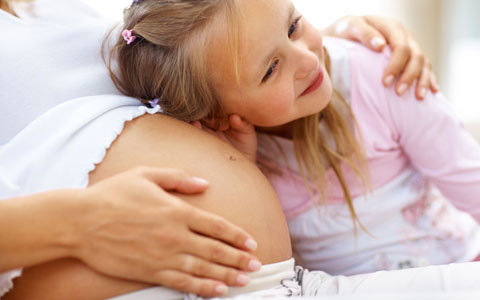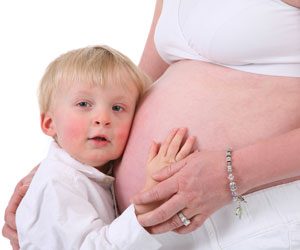 Generally speaking, you probably don’t have to go very far to find a woman who has given birth to a child after 35 – pregnancy after 35. The age at which women in Australia will have their first baby is increasing as many couples choose to achieve other goals first. Many celebrities have made headlines achieving a successful pregnancy after 40 – Halle Berry (at 41), Nicole Kidman (at 41), Geena Davis (twins at 48) and Kelly Preston (at 47) to name a few. However, we can probably safely assume that due to the money and influence these celebrities had at their disposal many forms of conception assistance might not be so achievable for the average person. So then when considering natural conception what really are your chances of achieving a pregnancy after 35?
Generally speaking, you probably don’t have to go very far to find a woman who has given birth to a child after 35 – pregnancy after 35. The age at which women in Australia will have their first baby is increasing as many couples choose to achieve other goals first. Many celebrities have made headlines achieving a successful pregnancy after 40 – Halle Berry (at 41), Nicole Kidman (at 41), Geena Davis (twins at 48) and Kelly Preston (at 47) to name a few. However, we can probably safely assume that due to the money and influence these celebrities had at their disposal many forms of conception assistance might not be so achievable for the average person. So then when considering natural conception what really are your chances of achieving a pregnancy after 35?
Chances of Pregnancy After 35
It might surprise you to know that your chances of achieving a successful pregnancy at or shortly after 35 are actually quite good, assuming there are no underlying fertility problems. The average 33-year-old has about an 85 to 90 per cent chance of conceiving within 12 months of trying. This drops to about 70 per cent by the time she reaches 37. However by the time a woman reaches 40 her chance of achieving a pregnancy is down to around 45 to 50 per cent and continues to decline steeping after that.
The Impact of IVF Treatment
Of course with the advent of IVF some 25+ years ago, women have had what appears to be an increased chance of conceiving a baby later in life. IVF has assisted many couples who would have otherwise had little chance of success, to conceive the baby (or babies) they longed for. However, it is important to remember that however miraculous IVF procedures may be, age still impacts your chances of success. At 35 years old the chance of live birth from one IVF cycle is around 30 to 40 per cent, and around 20 to 25 per cent at 38. By 40 your chance is only 15 to 20 percent per IVF cycle.
Pregnancy after 35: Causes of Declining Fertility
So why does our ability to conceive a child decrease with age? The answer is a simple one. Every woman is born into the world with all the eggs she will ever produce ready and waiting in her ovaries – about 400,000 in fact. During a healthy menstrual cycle, one of these eggs will mature and be released to possibly create a baby. As the years go by and your body ages, so do those eggs lying in wait.
Just like most of us are not in nearly as good condition at 35 as we were at 15 or even 25, so too neither are a woman’s eggs. As your eggs age they are less receptive to fertilisation and have less stored mitochondrial energy to drive the rapid cell division that occurs in the early days and weeks of an embryos life. This can consequently lead to a higher risk of miscarriage and chromosomal abnormalities. Men on the other hand continue to produce new sperm for many, many years after 35.
Other Points to Consider
Many women who set out to achieve a pregnancy after 35 will give birth to a healthy baby after a normal pregnancy. However there are a few considerations you need to keep in mind before attempting a pregnancy at this point in your life. After 35 women are at greater risk of fertility issues, miscarriage, stillbirth and infant chromosomal defects. In addition gestation diabetes or high blood pressure is more common in later pregnancies. Fatigue can also be more severe which can make working or caring for older children challenging.
Woman who give birth after 35 tend to have a higher rate of caesarean birth as well as a higher incidence of multiple births. That last one might seem more like a blessing than a risk but keep in mind that the human body was only ever intended to carry one baby at a time. Multiple birth carries with it greater risks of problems during pregnancy and birth including foetal distress, breech placement of one or both babies, premature birth and infant loss.
Maximising Your Chances
However it isn’t all bad news. As nerve wracking as attempting to achieve a pregnancy after 35 may seem it is most certainly possible if the conditions are right. Obviously if this will be your first child and you’d like to have more than one, you are likely to feel even more pressure to succeed. Making sound choices in terms of preconception care will undoubtedly increase your chance of success.
Counselling on preconception care is offered by most obstetricians and midwives in private practice. Your general practitioner may also be able to assist you, particularly if they routinely participate in shared maternal care with a local hospital. Some hospital-based midwifery units also offer preconception care information sessions you may wish to attend. There are some obvious lifestyle and well-being choices which will impact your chances so let’s explore them.
Drugs, Alcohol and Cigarettes
Everything you do and put into your body reflects in every cell within your body. That is, if you engage in lifestyle habits that are unhealthy you are directly impacting your body’s health at the cellular level. Remember those eggs that you have carried since birth? They are affected too. Avoiding illicit drugs and alcohol and giving up smoking are the first fundamental steps to improving your chances of success. Seeking help to manage these issues always makes sense and there are many support agencies that are experts in the field and can help you make a change.
Health and Nutrition
No matter how old you are, the healthier your body is the better your chances will be of conceiving and the better start in life you will give your baby. The first and most obvious step is eating a well-balanced and nutritious diet. Consulting a midwife or doctor can arm you with the information you need to begin to improve your nutrition, as well as outlining key supplements that will help your body to function at its best.
In particular, this will include eating a well-balanced, high fibre diet that is rich in fruits and vegetables. In addition taking folic acid helps to reduce the chance of some birth defects while also improving cellular health. Maintaining a healthy weight is also integral to conception success. If you are overweight or obese, consult your medical practitioner for advice on safely reducing your weight.
Exercise
Human beings were not meant to be sedentary creatures. Our bodies and minds function best when our day includes a good dose of exercise. If you have never exercised in your life, the preconception months are the time to start. Just 20 minutes of structured exercise three times a week can help to improve muscle tone, maintain a healthy weight and relieve stress. All of these factors can do nothing but help your chances of conception success.
If you have a good dose of will power you might like to try using a DVD to help structure your exercise routine. Pilates, yoga, a not too strenuous aerobic workout, pick one which interests you and try it. If you feel that you require more motivation, or you would like the assurance of a qualified instructor, consider joining an exercise class or a gym which offers them. Picking something which you can continue during pregnancy is ideal and your doctor or midwife can give you pointers on the types of exercise which best match for individual needs and abilities.
Health Issues
If you have health issues such as diabetes, high blood pressure, chronic health problems or a sexually transmitted disease (STD) it will be important to work closely with your doctor or midwife to get answers to any questions you have. Depending on your condition you may need treatment to maximise your chances of conception as well as extra care during pregnancy.
Pregnancy after 35: Fertility Counselling
If you have been attempting to achieve a pregnancy for some time with no success it may be best to seek out some fertility counselling. For many couples this can be a hard decision to make. It is important to remember though that after 35 your chances of succeeding are diminishing. Acting swiftly to address any fertility issues which may reduce the likelihood of pregnancy makes good sense. Not every visit to a fertility specialist ends in IVF treatment. There are many treatment options which can assist couples to conceive and a fertility specialist is best placed to assist you.
Genetic Counselling
It is quite widely known that as we get older the risk of conceiving a baby with a genetic disorder increases. That is not to say that young women do not give birth to babies with these disorders – they do! However, we know that because of the effects of aging on a woman’s eggs, the risk increases with time. Moreover, if there is a known genetic issue in your family it will be important to discuss with a genetic counsellor how this might affect your chances of conception and hopes for a healthy baby. Genetic counsellors can also provide you with a clean bill of genetic health as it were, which can be particularly valuable if you are looking to determine the cause of fertility issues.
Genetic Testing
Once you do conceive, your midwife or doctor may recommend you undergo genetic testing. This will help to determine what your baby’s likelihood is of having a genetic abnormality. In the first and second trimesters, screening tests can be performed using a blood sample combined with other information. An example is a measurement of nuchal translucency achieved using ultrasound. These tests can help to determine the presence of common chromosome abnormalities such as Down syndrome and Edwards syndrome. The risk of these chromosomal abnormalities increases with the age of the mother. Keep in mind these tests are not conclusive. But rather, it provides an indication of probability, and carry a fair margin of error.
If a woman is considered to be at greater risk of chromosomal abnormalities, such as in a later pregnancy, they may be offered more invasive testing. The most common tests available in Australia are Amniocentesis and Chorionic Villus Sampling (CVS). Amniocentesis is usually performed at around 15 weeks and involves inserting a needle into the woman’s abdomen to collect a sample of amniotic fluid for testing. CVS is usually performed at around 10 – 12 weeks and involves testing cells from the placenta. This is achieved either in the same way as Amniocentesis (Transabdominal CVS) or through the cervix (Transcervical CVS). Amniocentesis and CVS both tests carry a risk of miscarriage. That’s why it is important that couples discussed this with their midwife or doctor and consider their options carefully.

 Wish List
Wish List
Recent Comments